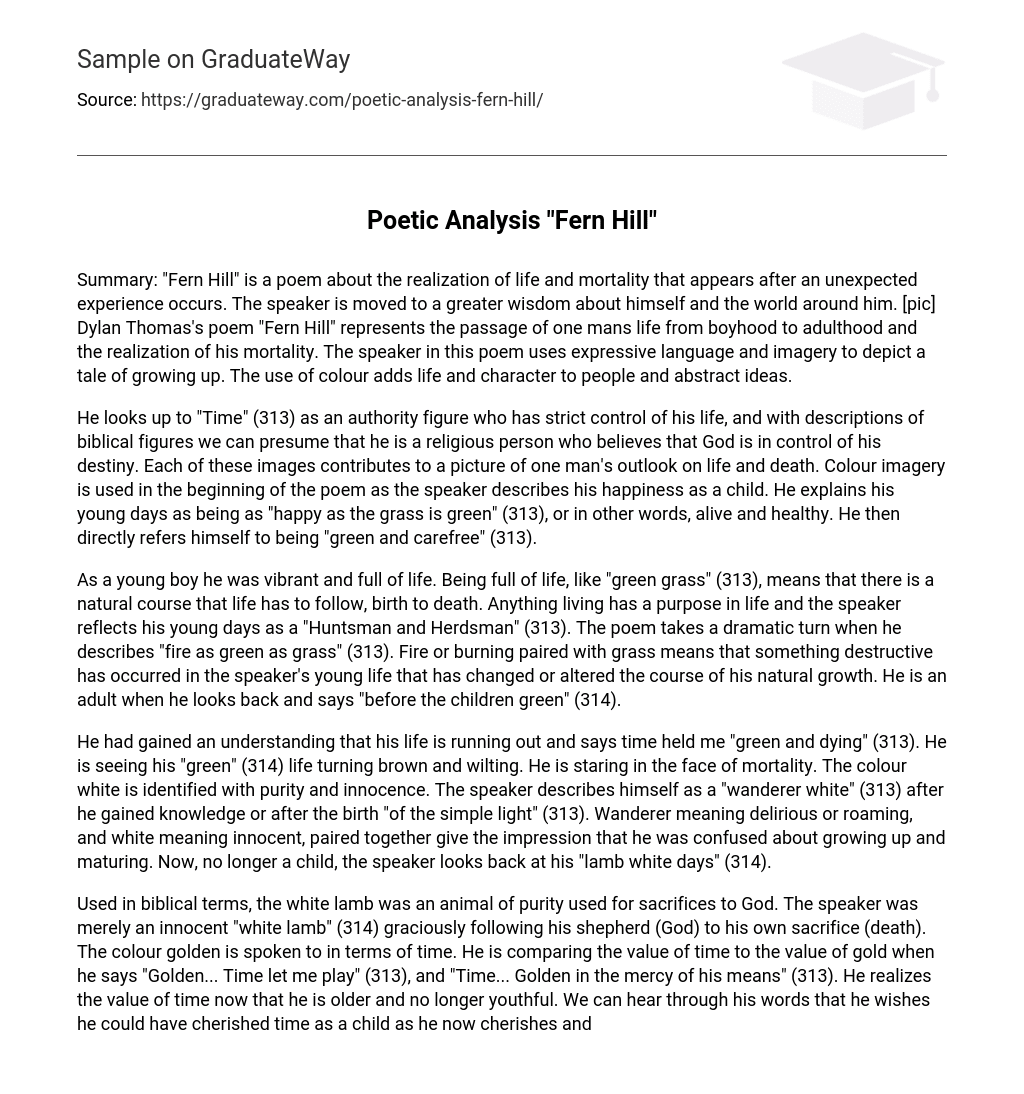Summary: “Fern Hill” is a poem that explores the revelation of life and mortality following an unanticipated event. The speaker gains a deeper understanding of himself and the surrounding world. [pic] Dylan Thomas’s poem “Fern Hill” portrays the progression from childhood to adulthood and the recognition of one’s own mortality. Through vivid language and imagery, the speaker narrates a story of maturation. The inclusion of color breathes vitality and personality into individuals and abstract concepts.
The speaker admires “Time” (313) and sees it as a figure of authority who has strict control over his life. The speaker also uses descriptions of biblical figures, suggesting that he is religious and believes in God’s control over his destiny. These images together create a portrayal of the speaker’s perspective on life and death. The use of color imagery is seen at the beginning of the poem when the speaker describes their childhood happiness. They describe their early days as being as joyful as the green grass, symbolizing their liveliness and good health. The speaker then directly refers to themselves as being youthful and without worries.
As a young boy, he exuded vitality and vitality was equated to being akin to “green grass” (313), symbolizing the natural progression of life from birth to death. Every living being has a purpose in life, and the speaker reminisces about his youthful days as a “Huntsman and Herdsman” (313). However, the tone of the poem drastically shifts when the speaker describes “fire as green as grass” (313). The juxtaposition of fire and grass suggests a destructive event in the speaker’s younger years that altered the course of his natural growth. Reflecting on his past as an adult, the speaker says “before the children green” (314).
He has come to realize that his life is coming to an end and expresses this by saying that time kept him both “green and dying” (313). He witnesses his vibrant “green” (314) existence transforming into a withered state. The inevitability of death confronts him. The color white is associated with purity and innocence. The speaker portrays himself as a “wanderer white” (313) after gaining understanding or after the birth of “the simple light” (313). “Wanderer” denotes confusion or aimlessness, while “white” conveys innocence. Together, these words imply that the speaker was bewildered about growing up and maturing. Now, no longer a child, the speaker reflects on his days of pure innocence, symbolized by being “lamb white” (314).
In biblical context, the speaker likens themselves to a white lamb, symbolizing purity, which was used for sacrifices to God. The lamb graciously follows its shepherd, symbolizing God, to its own sacrifice, representing death. The speaker also metaphorically refers to time as golden. They compare the value of time to the value of gold, expressing regret for not cherishing and valuing time when they were younger. Now that they are older, they realize the significance of time and wish they had treasured it during their youth.
He last uses the word “golden” in the past tense when speaking of the children being “before… golden” (313). As an adult, he is no longer as powerful as he was in his childhood. The time that was “golden” (313) has taken him far away from his “childless land” (314) forever. Time is not only seen as valuable and golden but also as a tangible figure. The speaker personifies time as a father figure who “allows” (314) him to play and be young. He associates time with an adult who supervises him and has strict control over his life. Time was once on his side, as he first says “once upon a time” (314).
As a child, he had no concerns about time. However, as an adult, he harbors resentment towards time for taking him away from his happy and carefree existence in childhood. He is also saddened by the fact that time allowed him to enjoy play and freedom, but now he desires to have control over his own time. Throughout his life, time has both nurtured his growth and brought him closer to death. He has come to realize that his youthful vigor will eventually run out of time and fade away, just like green grass wilts, days pass, and the sun rises in the east. The speaker acknowledges that life would not be possible without the existence of a supreme being that is remembered in the poem.
Using religious language and biblical allusions, the speaker expresses his faith and beliefs about life and death. At the start of the poem, he sees himself as a pebble in the “holy stream” (313), considering himself part of an endless flow of life. Another biblical reference arises when the speaker reaches a pivotal moment, comparing himself and his choices to Adam and Eve who gained knowledge by consuming a forbidden fruit.
” Fern Hill” is a poem that explores how experiencing life-changing events can shift a child’s perception of oneself. It delves into the narrator’s epiphany about the transient nature of life and the eventual mortality he confronts after an unexpected experience. This realization brings about a newfound wisdom regarding his own identity and the world around him. The poem depicts the notion that the sense of immortality he once believed in as a child was merely a preliminary stage in life’s ceaseless progression towards death. By employing vivid imagery, temporal references, and religious language, the poem allows readers to comprehend the narrator’s emotional journey, beliefs, and passage through life.





